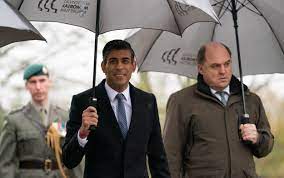Michael Fallon
How big an army do we need? Are we buying the right amount of high-tech kit? Similar issues have confronted every defence secretary – but today, as we reckon with war in Europe, there is one overriding question: what does the current war in Ukraine tell us that might reshape our military for our next conflict? This week’s Defence Command Paper should have been the moment to provide real answers.
Surely, the first lesson of Ukraine is that size matters. A country with an international role – in Nato, at the UN, and in partnership with the United States and key strategic allies across the globe – needs armed forces to match. When friends call for help, we have to be there to defend their freedoms and our values – and to be able to deliver that, an army of just over 70,000 is too small. Kyiv’s formidable forces have shown the power of having the numbers ready to fight. Ben Wallace is right, of course, that a larger army would require a bigger defence budget. We’re spending just over the Nato minimum, at 2.1 per cent of GDP. But Russia was spending a higher proportion of its GDP in the run up to the invasion and even that hasn’t proved enough for them. Meanwhile, China is developing a third aircraft carrier, nuclear ballistic submarines and a massive surface fleet.
If you still think 2.1 per cent is enough, consider this: at the turn of this century, before 9/11 and international terrorism, before Russia invaded Crimea, before Iran and North Korea developed long-range missiles, before China openly threatened Taiwan, we were spending 2.7 per cent. The Prime Minister and Chancellor have talked of a new target of 2.5 per cent but, despite all encouragement, this is still just talk. Without a firm glide-path towards it, the need to plan and pay for new and expensive weaponry means that the Army in particular will continue to shrink. Whitehall jargon about “draping capabilities across platforms” and “it’s all about the effect you deliver” is no substitute for hard numbers of well trained and deployable troops.
The second lesson of Ukraine is that you must plan for the unexpected. In my first few months as defence secretary, we had to organise our new Nato deployment of hundreds of troops to Estonia; we had to send men to join a huge allied training programme to help rebuild the Iraqi forces struggling against Daesh; we started to plan British Army training of the Ukrainian army resisting the original Russian advance into the Donbas back in 2014. In the midst of all this, we suddenly had to dispatch 700 troops and helicopters to tackle the deadly outbreak of Ebola in Sierra Leone.
And all of it came on top of existing commitments in Northern Ireland, in Cyprus, in different trouble spots in Africa and across the Middle East, and alongside domestic preparedness here to help with floods, tanker driver and ambulance disputes, and backing up armed police guarding against key terrorist targets.
The next defence secretary may have to be ready to send hundreds more troops to reinforce Nato’s eastern frontier, to defend British interests in the Gulf, to stand by allies under threat in the Indo-Pacific. You simply can’t honour all these commitments with small packets of soldiers, endlessly rotated. The third lesson is perhaps the most important of all. Ukraine mobilised extraordinarily quickly to combat the Russian invasion. It has been a whole of nation effort, involving not just regulars and reserves but civilians, too. It is a war of technology, to be sure, involving drones and long-range missiles, but it is also a war of territory. And defending territory means holding and recapturing ground. That requires infantry supported by armour and artillery. Even with earlier and better air support from the allies, this would still have been a ground war fought by soldiers.
Ukraine, like Russia, has thrown thousands of men into this fight. If Nato’s north-eastern border is breached, if Russia again threatens Georgia and Moldova or the western Balkans, we would have to mobilise here in numbers, too. These are, as the Defence Secretary acknowledges, very dangerous times. Far from cutting Army numbers, we should be increasing them, and supplementing them with stronger reserves.
The Telegraph







